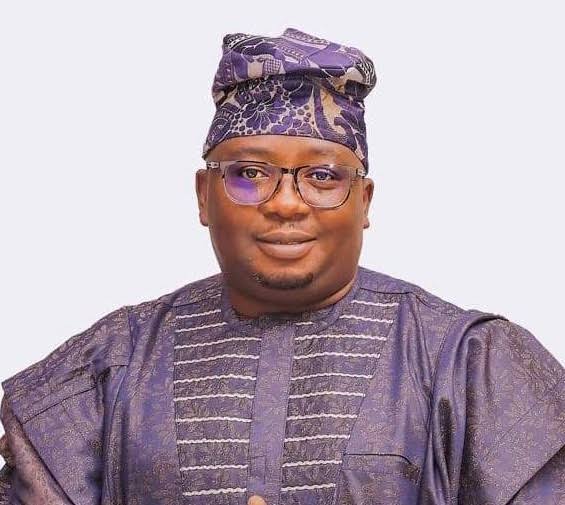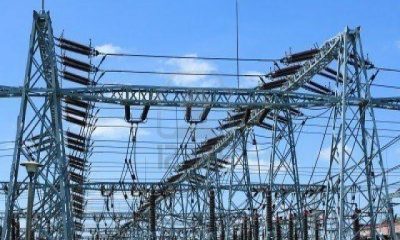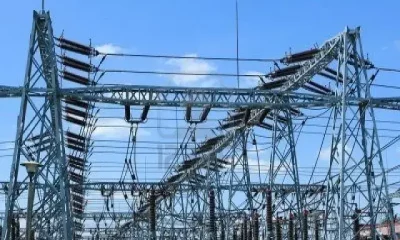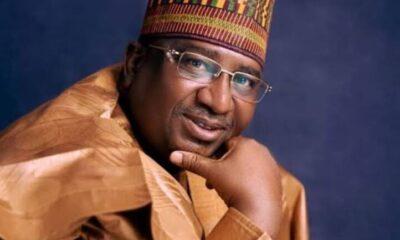Headline
Nigerians ‘ll witness improved power supply soon – Adelabu

The Minister of Power, Mr Adebayo Adelabu, has promised Nigerians that they will witness improved power supply across the nation soon.
Adelabu made the promise on Friday in a chat with newsmen when he arrived at the Ladoke Akintola Airport, Alakia Ibadan.
The minister, who received a rousing welcome from his political associates, supporters, family and friends, noted that his ministry was the most criticised sector and so important to the economic emancipation of Nigerians.
According to him, the task ahead is huge because the nation has suffered so long as a result of the low performance of the ministry, in terms of power supply to Nigerians.
Adelabu, however, allayed the fear of Nigerians about the challenge, saying the turn-around they had been looking for in the power sector had come.
The Minister said he would do everything possible to make sure the Ministry, under his leadership, laid a good foundation for 24/7 power supply in Nigeria.
“We know it’s not something that is achievable overnight but we believe that once the foundation is laid, others can also build on it.
“I can tell you that between six months and one year, we will start seeing improvement in the power sector.
“Within the next six months, there would be major addition to the national grid, in terms of hydro power plant, that is the Zugeru 700mw in Niger state, that is about to be completed. This will be the biggest one in Sub-sahara Africa when completed.
“The Kanji dam that we all grew up to know supplies about 460mw, Sororo dam supplies about 520mw.
“I will do everything to ensure that Zugeru power plant is inaugurated and subsequently add 700mw to the national grid,” he stated.
The minister noted that it was a fact that some resources had been wasted in the sector and it had not really succeeded as expected by Nigerians.
He, however, reminded Nigerians that “this is a new era and I will use everything that God has given me to ensure that we have stable power supply in the country.”
Adelabu hinted that he and all relevant people in the sector would sit down, between two weeks and one month, to study what was on ground.
“The status of each of the stages in the power supply value chain, be it generation, distribution and transmission, to know where the challenges are.
“When we study all these, we will be able to put together a turn around master plan of the power sector and inform Nigerians of the master plan of the sector under my leadership.”
He expressed appreciation to President Bola Tinubu for counting him worthy for the position of minister, pledging to exceed the expectations of Nigerians in general.
NAN also reports that the minister and his entourage later observed Jumat service at Oja’Oba Central Mosque Mapo Ibadan, where Sheik Abdulganiyu Agbotomokekere charged him to use his new position to the service of humanity.
Agbotomokekere urged Adelabu to have the fear of his creator in his day to day activities while carrying out his statutory responsibility.
The minister, who also paid a courtesy visit to the Olubadan of Ibadan land, was encouraged to be a good ambassador of Ibadan land.
Speaking on behalf of Oba Olalekan Balogun, the Olubadan of Ibadan land, Oba Abiodun Daisi – a member of Olubadan in Council, congratulated Adelabu on the new appointment.
He described the minister as a humble and industrious son of Ibadanland, “who is an exceptional person because of his love for Ibadan land”.
“Adelabu’s passion for his home town, Ibadan, made him to establish many industries in Ibadan land where many people were employed to earn their living.
“I urge you, on behalf of Olubadan, to do your best in fixing the problem of electricity in Nigeria,” he said.
Headline
Fagbemi warns against obstructing EFCC from performing its lawful duty

The Minister of Justice, Lateef Fagbemi, SAN has warned against obstructing the Economic and Financial Crimes Commission (EFCC) from carrying out its lawful duty .
Fagbemi’s warning is contained in a statement in Abuja.
“This is a matter of very grave concern, it is now beyond doubt that the EFCC is given power by the law to invite any person of interest to interact with them in the course of their investigations into any matter, regardless of status.
“Therefore, the least that we can all do when invited, is not to put any obstruction in the way of EFCC, but to honourably answer their invitation.
“A situation where public officials who are themselves subject of protection by law enforcement agents will set up a stratagem of obstruction to the civil and commendable efforts of the EFCC to perform its duty is to say the least, insufferably disquieting’’.
He added that running away from the law will not resolve issues at stake but only exacerbate them.
“Nigeria has a vibrant judicial system that is capable of protecting everyone who follows the rule of law in seeking protection.
“I therefore encourage anyone who has been invited by the EFCC or any other agency to immediately toe the path of decency and civility by honouring such invitation instead of embarking on a temporising self-help and escapism.
“This can only put our country in bad light before the rest of the world’’.
He said institutions of state should be allowed to function effectively and efficiently.
“I stand for the rule of law and will promptly call EFCC, and indeed any other agency to order when there is an indication of any transgressions of the fundamental rights of any Nigerian by any of the agencies’’.
NAN reports that the EFCC had on Wednesday warned members of the public that it was a criminal offence to obstruct officers of the Commission from carrying out their lawful duties.
Section 38(2)(a(b) of the EFCC Establishment Act makes it an offence to prevent officers of the Commission from carrying out their lawful duties. Culprits risk a jail term of not less than five years.
The warning , the EFCC said, became necessary against the background of the increasing tendency by persons and groups under investigation by the Commission to take the laws into their hands by recruiting thugs to obstruct lawful operations of the EFCC.
On several occasions, the anti graft agency said, operatives of the Commission have had to exercise utmost restraint in the face of such provocation to avoid a breakdown of law and order.
Headline
Unknown Gunmen Abduct Channelstv Reporter In Port-harcourt

Some unknown gunmen have kidnapped Joshua Rogers, the ChannelsTV reporter in Port-Harcourt, the Rivers State capital.
Politics Nigeria learnt that Rogers was picked up close to his residence at Rumuosi in Port Harcourt and to an unknown destination by the gunmen around 9pm on Thursday, April 11.
The reporter was driving his official ChannelsTV branded car when the hoodlums accosted, pointed a gun at him and took him away in the same vehicle.
Rogers was said to be returning from his official assignment in Government House after a trip to Andoni for a government event when the incident happened.
Already, the gunmen were said to have contacted his wife and demanded a N30million ransom for bis release.
His cameraman confirmed the incident and appealed to his abductors to set him free unconditionally.




















